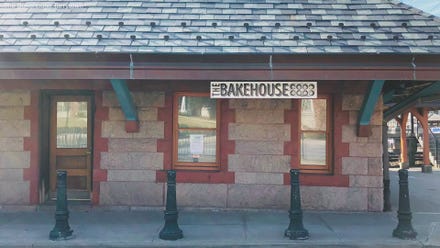
The Latest

Neil A. Carousso Joins Growing NewsNation Network

Neil A. Carousso Departing WCBS 880

Art Business Founded by Former Foster Child Speaks to the Human Experience

1010 WINS Small Business $10K Challenge: Small Business Owners Make their Pitch for $10,000

NYC’s Élan Flowers Evolves into Blooming Subscription and Corporate Services

Creating an Authentic Retail Experience Online

WCBS Business Breakfast: Growth in the Hybrid Workplace

Creating a Small Business Growth Strategy

Long Island City’s Growing Business District

SuperQuickQuestion Creates Short and Sweet Interactions with Pro Athletes and their Fans
-
NYC Tour Company Grows Revenue with New Profitable Services
Post Views: 698By Joe Connolly and Neil A. Carousso
NEW YORK (WCBS 880) — A New York City tour business has been growing despite the pandemic shutdown by adding new viable services.
Cindy VandenBosch and Andrew Gustafson are the husband and wife duo at the helm of Turnstile Tours. Both of them have decades of experience in history, museums and tourism. Over the past 10 years, they’ve built a diverse portfolio of programs with unique New York stories at historic sites such as the South Street Seaport, the Brooklyn Navy Yard and the Brooklyn Botanical Garden.
They focus on the “people in the place” to develop the most compelling content. That recipe translated to virtual tours in the pandemic, which helped them amass an audience outside New York.
“We’ve just been able to spread our wings and share so many more stories through the virtual format,” VandenBosch told Joe Connolly and Neil A. Carousso on the WCBS Small Business Spotlight, sponsored by Dime Community Bank.
Quickly, they figured out a way to offer daily virtual tours on a variety of subjects to both educate and entertain. VandenBosch and Gustafson hosted more than a 100 consecutive virtual programs at one point as the coronavirus kept people home.
As hundreds of people signed up to participate in interactive virtual tours, they launched a monthly membership program.
“People sign up for a monthly membership, and then, they get access to a certain number of programs per month, and then, they can they can access our library as well,” said Gustafson. “That ongoing revenue has been really important to us.”
Now that Turnstile Tours is back in-person, they host members-only events to retain repeat customers for its premium service. They plan to continue virtual tours in some capacity even though COVID-19 restrictions have been lifted because of the opportunity to reach a mass audience.
It was their partnerships with non-profits that helped them become more than a tourism business.
“We could create this kind of suite of services working behind-the-scenes to help either existing institutions be better at what they do or to help them grow a new program,” Gustafson recalled.
As they and their team learned video production and editing engaging content to capture a digital audience, Turnstile Tours began offering those in-demand services to partners and clients.
“This spring, we supported the Brooklyn Botanical Garden for their spring virtual festival. So, we were behind-the-scenes, our team, producing and directing, helping with their ‘Making Brooklyn Bloom’ programming, which they normally do in-person,” said VandenBosch.
“We were really proud to have developed the skills just through practice,” she added.
You can get ideas for creating adjacent services to grow revenue on the WCBS Small Business Spotlight video above.
-
Hometown Flower Collective Expands Flourishing Mobile, Digital Business
Post Views: 797By Joe Connolly and Neil A. Carousso
NEW YORK (WCBS 880) — This business has mastered digital sales and is now doing the reverse pivot in their expansion.
On the WCBS Small Business Spotlight, sponsored by Dime Community Bank, Joe Connolly and Neil A. Carousso caught up with Jaclyn Rutigliano of Hometown Flower Collective who brought her 1976 Ford F100 to Huntington for the WCBS Business Breakfast in October 2019.
Jaclyn was positioned to succeed in the pandemic with a digital and mobile-first business that has since accelerated with her strategic use of Instagram and local partnerships.
“Since day one, we really knocked on all the doors of any like-minded businesses just to say, ‘Hey what can we do?’ From a photo shoot to an event to a workshop to free flowers to a giveaway, anything, collaboration has been the number one focus and the number one growth tool for us,” she said.
“If you’re looking to go online, pay attention to that and try to offer ways to help other small businesses because that’s really what we try to do. Help us, help you.”
Hometown Flower Co. is increasing their mileage. They recently expanded their footprint from Long Island to Brooklyn and Queens.
“There are some incredible designers, especially in Brooklyn, so it’s definitely humbling,” Rutigliano said. “Our design aesthetic really has resonated with a certain group, especially in Brooklyn and Long Island City and those parts. It’s been fun and it’s also attracted some people in the media landscape and fashion world.”
The public relations professional told Connolly and Carousso that the city can be intimidating, but called it “validating” for her business.
Hometown Flower offers monthly, weekly and annual subscription services to its customers, sourcing from 10 to 12 Long Island farmers. They played an important role helping their customers cope with the sadness of the COVID-19 pandemic, and now, they are being approached for large-scale and private events.
“We’ve increased our wedding work, which is something we never thought we would be doing,” Rutigliano said.
She and her husband Marc Iervolino have also opened their first brick-and-mortar store in Huntington Village to service pickups across Nassau and Suffolk Counties. Rutigliano realized she and her Ford truck cannot be everywhere at once.
By all accounts Hometown Flower Co. is operating on all cylinders, but Jaclyn and Marc are struggling to find skilled workers, which is hindering their ability to scale.
“It’s been very difficult to find drivers, it’s been very difficult to find administrative and associate-level support as well. It’s tough and we can’t scale if we don’t have the support. It’s just not sustainable,” she said.
They were able to find a designer who Jaclyn refers to as her “right hand.” Before the hire, Jaclyn had been designing until 3-4 AM every night. But, in order for them to grow even more, Hometown Flower will need support staff. Meantime, they’ve had to turn down some events that are coming back in full force this summer.
See this creative, flourishing business in-action and see how Hometown Flower Co. is managing fast growth on the WCBS Small Business Spotlight video above.
-
Queens Juice Bar Owner’s Recipe for Success Blends Passion for Nutrition, Mentorship
Post Views: 691By Joe Connolly and Neil A. Carousso
NEW YORK (WCBS 880) — Making the leap to start your dream business can be daunting, especially in uncertain economic times.
While a record number of new businesses have been formed during the pandemic, succeeding in a new venture presents a myriad of challenges, and for that reason, roughly 20 percent of small businesses fail within the first year, according to the U.S. Bureau of Labor Statistics.
Dawn Kelly was let go from Prudential Financial in 2015 after 16 years leading its global communications team. Before that, she spent about nine years with AARP and roughly five years as director of public relations for York College. She combined her severance pay from Prudential and her savings to fund The Nourish Spot – a juice bar she opened in Jamaica, Queens with her daughter.
“When we started The Nourish Spot, I spent over 30 years as a public relations practitioner for a number of different brands and organizations, so I lean on that for the business,” she told Joe Connolly and Neil A. Carousso on the WCBS Small Business Spotlight, sponsored by Dime Community Bank.
Now a mentor at the NYC Department of Small Business Services, Kelly says anyone looking to start a business does not necessarily need an infusion of capital. She advises small business owners to never feel shy about promoting themselves because it is essential for marketing any business.
“I was taking clients before The Nourish Spot opened to help them promote themselves,” Kelly said.
“This wasn’t really a dream for me. I’m an employee,” she explained on the Small Business Spotlight as her workers made smoothies behind the counter in the background.
But, her passion for nutrition and mentorship is palpable.
“I actually thought that I would work until I didn’t anymore. But, God had another idea for me. He gave me this idea to do the juice bar and I’m really proud that it’s actually working,” said Kelly, flashing a smile from ear-to-ear.
She was accepted into a program through the Rockaway Development & Revitalization Corporation and took online classes during the pandemic to guide her through managing the business and launching new services.
While most people walk in to The Nourish Spot to order a smoothie off the menu, Kelly realized there was a market for people with medical conditions. One of her customers is a home health aide in Queens who walks in with a prescription from her client’s doctor.
“Her client doesn’t eat as much fruits and vegetables as they’re supposed to. And so, the way she makes sure that her client consumes the balanced diet, is she comes and makes a smoothie for them and then takes it to them,” she said.
She also worked with non-profit organizations during the pandemic to help combat food insecurity in her neighborhood, which was once the epicenter of the coronavirus in the spring of 2020.
Kelly lives by the principle of treating people the right way. She empowers her workers to pass on joy with a smile and grace. Many of them, Kelly sourced from local non-profits when she opened The Nourish Spot.
“These young people came into us as interns. And, those that showcased themselves as dependable, honest, passionate about food and people, we’ve hired them,” she told Connolly and Carousso.
She said she tapped into a “community pipeline” of talented, hard-working people who just need an opportunity to prove themselves and flourish. Some of her employees have worked at the juice bar for nearly four years.
“We’re really really proud,” said Kelly.
See her story and pickup ideas for new services on the WCBS Small Business Spotlight video above.
-
Small Business Spotlight: What NYC’s New Normal Will Look Like this Fall
Post Views: 978By Joe Connolly and Neil A. Carousso
NEW YORK (WCBS 880) — The post-pandemic future could be a win-win for workers.
Many businesses are preparing to welcome their employees back to the office after Labor Day, but they’ll be returning to a new normal.
“I think this time there’s going to be much more of an interconnected expansion and that that you’ll have more people that might be working in satellite offices or remotely in the suburbs, have a quality of life that’s more affordable, more open space, but then be able to come to the city when they want to be in the city and interconnect with these companies,” said Scott Rechler, chairman and CEO of RXR Realty, which owns large office buildings in New York City and the suburbs.
On the WCBS Small Business Spotlight, sponsored by Dime Community Bank, Rechler told Joe Connolly and Neil A. Carousso he expects both the city and the suburbs to recover “collectively.” He said most of his business tenants anticipate being back in September, but not at full capacity.
“We need to start reimagining a post-pandemic playbook,” he said.
That playbook includes hybrid schedules and a redesign of the city.
“There’s some office buildings and there’s frankly some retail buildings and hotels that just will not be competitive in a post-COVID world,” said Rechler. “The right thing to do in that instance is to convert them to multi-family.”
The Regional Plan Association Chairman told WCBS 880 adding multi-family apartments in place of empty office buildings could improve New York’s affordability and attract people to work and live in the five boroughs.
New apartment leases in Manhattan are at record levels as tenants gobble up rentals at a discount while preparing to return to offices. The number of new leases increased fourfold in May from the year previous to 9,491, according to Miller Samuel Inc. and Douglas Elliman Real Estate.
“(It) gives me confidence that people believe in the future of New York,” said Rechler, adding, “If they’re here, the big companies that want to attract that talent, that bring that talent in to grow their businesses, are going to be here as well. So, it’s a great leading indicator of what’s to come.”
Rechler, who oversaw the redevelopment of the World Trade Center as the vice chairman of the Port Authority of New York and New Jersey, told Connolly and Carousso hybrid work schedules are here to stay, though, because there is a “quality of life” balance that many people have enjoyed while working from home.
He’s advising businesses, telling them, “Don’t be a prisoner of the past, be a pioneer of the future.”
While productivity was high during the height of the COVID-19 pandemic in the spring of 2020, the developer said businesses are finding productivity is slumping now that the U.S. has largely reopened 15 months after the initial shutdown.
“This is about bringing people back so they can build culture, they can have mentorship, collaboration, a sense of community, and create that corporate value set that makes their team members feel part of something bigger,” Rechler said. “You’re not going to get that if everyone’s in different satellite offices.”
See how developers are planning New York City’s post-pandemic future on the Small Business Spotlight video above.
-
Westchester Bakery Forced to Pivot Online Discovers Promising New Business Model
Post Views: 685By Joe Connolly and Neil A. Carousso
NEW YORK (WCBS 880) — The macroeconomic effects of the COVID-19 pandemic are measurably impacting local businesses, their workers and their customers.
Rising commodity prices and the labor shortage are two of Liv Hansen’s biggest challenges at The Bakehouse in Ardsley and Tarrytown. It’s now forcing her to rethink her traditional business model at her family-run bakery.
“Some of the foods we buy are up 8 percent,” Hansen told Joe Connolly and Neil A. Carousso on the WCBS Small Business Spotlight, sponsored by Dime Community Bank.
The Bakehouse is known for its custom homemade cakes. They also sell a variety of baked goods, sandwiches, soups, and even, pot pies. Hansen and her husband took over the Ardsley location at 660 Saw Mill River Rd., known as The Riviera, from her mother about 10 years ago. The Riviera Bakehouse has been a community staple since 1950.
The bakery business in Ardsley had been thriving before the pandemic, attracting customers from Westchester, Rockland and the surrounding areas. In March 2020, Hansen opened a new location inside the former Metro-North station building only to shut down when the coronavirus emerged the same month. They anticipate sales of breakfast goods and treats will spike when more Manhattan commuters pass through.
“We’re hoping as the city opens up that the commuters are up in full force,” Hansen said.
But, The Bakehouse is struggling to find enough skilled workers to make the volume of homemade custom cakes they churned out pre-pandemic. Currently, they employ four full-time workers and three part-time workers. They had been down to two workers at the height of the pandemic.
As a result, Hansen is expanding her website with “semi-custom” homemade cakes to order for occasions from graduations to weddings to birthdays.
“We hope that in the future, that will become our main source of orders,” she said. “It is much more efficient for us because we see what’s coming in really quickly rather than having people place the orders via phone and have a hand-written order.”
Even traditional businesses like bakeries have been disrupted by the pandemic. It’s become essential for The Bakehouse to streamline operations and make more cookie-cutter products with a selection of custom features to grow profit margins.
Hansen has also found cost savings in ingredients. When matzo meal became unavailable, The Bakehouse took one of their popular chocolate cakes of the shelves and developed a cake-like brownie special from a current recipe.
“Really, it’s cake, but it’s a very moist cake and we top it with different things,” she explained. “We have an Oreo one, just a plain fudge one, we have one with sprinkles, one with peanut butter butter cream, and we sell them as brownies.”
Since kitchen staff at The Bakehouse make the chocolate cake daily anyway, it saves time, labor and commodity costs, and increases their margins with an additional tasty dessert on the menu.
“It has made a great efficiency for us,” said Hansen.
See ideas to make yourself sustainable in the post-pandemic economy and grow profit margins on the Small Business Spotlight video above.
Social Feeds

VIDEO: Told the airline to book us on the next flight out (SPONTANEOUS TRIP!)

VIDEO: The Taylor Swift Effect | WCBS Business Breakfast

VIDEO: Future of NYC | WCBS Business Breakfast

VIDEO: Reasons for New Yorkers to be Optimistic | WCBS Business Breakfast

VIDEO: NYC's AI Chatbot | WCBS Business Breakfast






